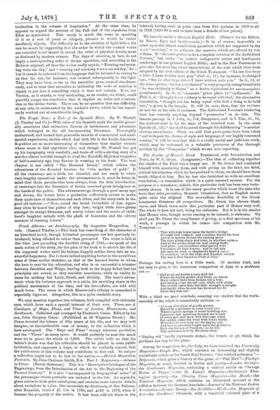The Bible Record of Creation True for Every Age. By
P. W. Grant. (Hodder and Stoughton.)—This is a really ingenious b:wk, though we can well imagine that there are those who will say that it is a specimen of wasted ingenuity. Its reasonings occasionally strike us as far- fetched ; still it may well be read by persons who wish to see how various are the interpretations which the Mosaic cosmogony admits. It cer- tainly has the merit of being suggestive, and now and then the author seems to strike out a new line of thought on this much and long-dis- cussed subject. He will not allow us to describe the three first chapters of Genesis as myth or poetry, but maintains that they are inseparably related to the context, and are, in fact, "an unspeakably precious in-
troduction to the volume of inspiration." At the same time, he appears to regard the account of the Fall and of the expulsion from Eden as symbolical. This surely is much the same as speaking of it as a sort of poem or allegory, phrases to which he rather needlessly objects. The difficulty as to the creation of light before the sun he meets by suggesting that the order in which the created works are recorded is not meant to reveal the order of physical development as disclosed by modern science. The days of creation, in fact, do not imply a corresponding order of divine operation, and according to the Hebrew original, all that the writer really says is, "Evening and morn- ing were one day," and "evening and morning ware a second day," &c.; but it cannot be inferred from his language that be intended to convey to us that the sun, for instance, was created subsequently to the light. They may have been, so far as the narrative goes, created simultane- ously, and to treat that narrative as indicating the order of creation is simply to put into it something which it does not contain. If so, our Version, as it stands, is very misleading, as no reader, we think, could possibly escape the conclusion that it implies an order and a succes- sion in the divine works. There can be no question that one difficulty, at any rate, is surmounted by the author's views, which he has ingeni- ously worked out at considerable length.



































 Previous page
Previous page